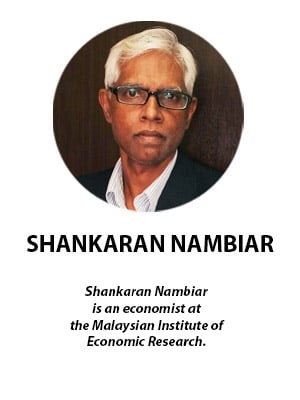 Anwar Ibrahim, Malaysia’s 10th prime minister, is set to spell a new age for the Asian Renaissance, and Malaysia may be the home for the birth of this new-fangled movement.
Anwar Ibrahim, Malaysia’s 10th prime minister, is set to spell a new age for the Asian Renaissance, and Malaysia may be the home for the birth of this new-fangled movement.
In his 1996 book, “Asian Renaissance”, Anwar advocated the decolonisation of the Asian mind, signalled by adherence to the fundamental precepts of Asian civilisations. The Renaissance, in his view, was to be based on firm moral and religious values.
Anwar laid great emphasis on pluralism and tolerance in his book, arguing for a reawakening that is based on man’s position as God’s vicegerent on earth, rather than as an agent that seeks to rebel against God. The Asian Renaissance would, then, not follow in the mould of the European experience.
At about the same time, Anwar, as a man of great ideas, proposed the Asian Monetary Fund (AMF). The AMF was something that the Japanese, too, strongly advocated in 1997, subsequent to the Asian Financial Crisis. Anwar was at that time the finance minister and had witnessed the fallout of the Asian financial crisis.
It was a notion that was ahead of its time and was not well-received.
Things have changed since.
Today, China is an economic powerhouse; it is the second-largest economy in the world and is set to be the largest in 2030.
S&P and Morgan Stanley predict India will be the third-largest economy in the world in seven years, only below the US. PwC claims India will be the second-largest economy by 2050.
It might have been precocious to think of the AMF when Anwar first mooted it 26 years ago.
The centre of economic gravity will have shifted to the east by 2030, making the AMF a more plausible suggestion. If China can establish an Asian Infrastructure Investment Bank, it is logical that it would want to set up a regional institution that can supplement the IMF. China wants to assert its leadership in this part of the world.
Anwar, during his visit to China, had the approval of Chinese President Xi Jinping in reviving the plan.
As China rises to prominence and comes to assume a more central role, it stands to reason that it would also have a greater say in the financial architecture of Asia. Anwar sees a role for himself in this “Game of Thrones”.
Anwar recognises in Xi a kindred soul who can support his own ambitions to take Malaysia forward, perhaps even allowing Malaysia to play a pivotal role in the Asian resurgence.
Dedollarisation is another crucial instrument in asserting Asia’s economic and financial independence. Anwar has taken his first steps in this matter.
Recently, Malaysia has decided that trade with India can be settled in the currency of either country, a significant decision that was made without too much fanfare
Malaysia is not alone in thinking that the time is ripe for dedollarisation. Saudi Arabia thinks so, too. And so do Brazil, Russia, India and China.
Anwar may want Malaysia to take a more active role in determining Asia’s role in the global economy. Just as Jawaharlal Nehru offered leadership for Asia in the non-alignment years through the power of his intellectual prowess, Anwar may want to play a similar role.
As a first step, Asean member states will have to be convinced that there is merit in accepting dedollarisation as a goal, and in pursuing the AMF.
Indonesia, for instance, has expressed reluctance in subscribing to the notion of an AMF, pointing out that gaining the agreement of Asean members will not be easy. Neither will it be easy to obtain funding from countries in the region. Without adequate funding, the idea will never get off the ground.
The Indonesian economic affairs minister has very realistically pointed out that companies are slow to adopt local currency settlement (LCS) in their transactions. And this although the government encourages the use of LCS.
The US may not be keen to support the AMF. Former prime minister Dr Mahathir Mohamad proposed the East Asian Economic Caucus which was not taken up by Japan. The US had strong arguments against Mahathir’s idea.
It is too soon to say, but there is a good chance that the US may find the AMF proposal unappealing. The US may counter-propose that the Pacific be included, leading to an Asia-Pacific Monetary Fund, an institution that may not be in line with Anwar’s vision.
The AMF-dedollarisation complex may be perceived as being an attempt at diluting the US’ influence in this part of the world. Obviously, the US is not going to be welcoming of any such attempt.
Big ideas are often smothered by the difficulty of executing them. In this case, a fair amount of coaxing must be done to gain buy-in from potential supporters. Those who think that they stand to lose from new arrangements will have to be persuaded that any institutional rearrangement only has winners and no losers.
But now is probably a better time to suggest an AMF than it was 26 years ago. All the more because currently, Malaysia has a powerful ally who is equally passionate to see the rise of the Asian Century. - FMT
The views expressed are those of the writer and do not necessarily reflect those of MMKtT.



No comments:
Post a Comment
Note: Only a member of this blog may post a comment.